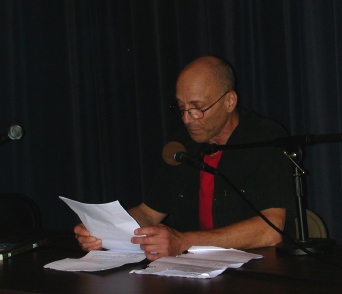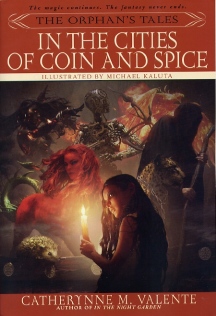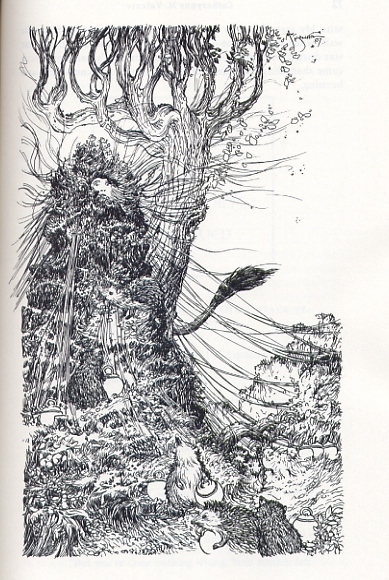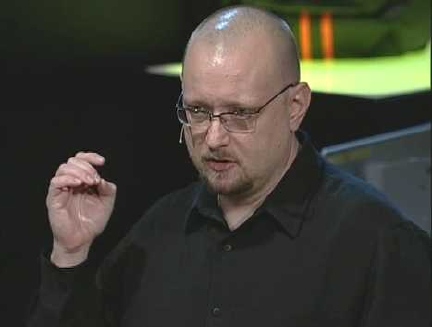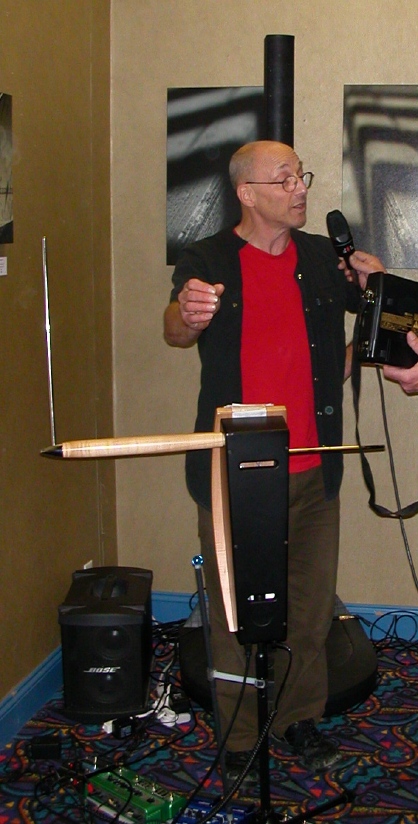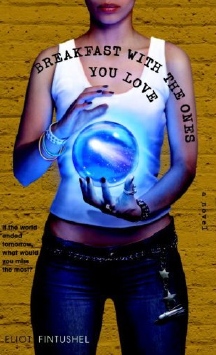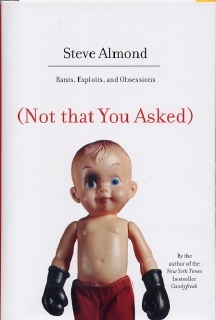|
|
|
|
This Just In...News
From The Agony Column
|
|
10-26-07: Catherynne M. Valente Unfolds 'The
Orphan's Tales' ; Agony Column Podcast News Report : 'Tastes Like Cuba'
|
'In the Night Garden', 'In the Cities of Coin
and Spice'
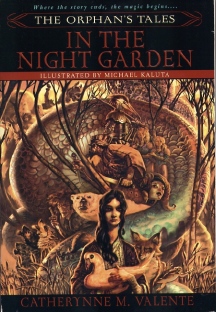
|
|
Beautiful
to look at, better to read. |
Here's one I missed
that I should not have missed, but the second arrives in time to let
readers know about the first – as well as the
second. I spoke with Catherynne M. Valente shortly before the release
of her first
novel, the intense, surreal 'The Labyrinth'. I even got her to read
some poetry and short fiction; here, here, here and here. She had mentioned
an upcoming project in that interview, but I never saw
the
fruits of
those
labors
until the second volume arrived on my doorstep. I may miss books once
in a while,
but I'm not completely without clue.
And thus, I commend readers to run, not walk to their bookstores and
find Valente's 'The Orphan's Tales: In the Night Garden' (Bantam Spectra
/ Random
House ; November 2006 ; $14.00) and the follow-up, 'The Orphan's Tales:
In the Cities of Coin and Spice'. These books are everything a book
should be; well-written, imaginative, lushly illustrated, nicely produced
and
bargain priced. For everyone falling over themselves to find "The
next" who-the-heck-ever, forget that quest and hope that there's
someone else out there as good as Valente, who sculpts bizarre, beautiful,
ornate
dreams into shimmering little jewel-like stories. And those little
jewels turn out to be letters in a larger alphabet, the stories pieces
of a larger
weave.
The setup here is simple, familiar and yet nicely innovative. "...A
child whose face was like the new moon shining" sits in the Palace
Garden alone. She was born with an unusual birthmark inside her eyelids,
from which she reads stories. Stories of strange monsters and curses and
fates best not imagined. Those stories comprise the novels, but they slot
into a larger story as well. They’re intricate, intelligent,
funny, disturbing; they are life, refracted through a vivid imagination
with a
facility for lovely language.
|
|
Interior
Illustrations by Michael Kumata. |
Yes, it's The Arabian Nights re-birthed for the 21st century. Frankly,
we could use it. But the stories here are not the whole story. I'm
generally disinclined to like the sorts of books that New York prints.
Mostly, they're
just product, but somebody put a lot of care into these, and at fourteen
bucks a pop, they really give the small press a run for its money.
Vivid line drawings by Michael Kumata illuminate the manuscript within,
matched
by fantastic interior book design done by Glen Edelstein. 'In the Night
Garden' sports cover design by the ever-dependable Jamie S. Warren
Youll and cover art by Jon Foster. Michael Komarck provides the cover
illustrations
for 'In the Cities of Coin and Spice'; otherwise the design team remains
the same.
And this is important to Valente's work. Make no mistake, her prose
could carry the day. But the book design and even the trade paperback
format
all contribute to a much richer reading experience. These are books
that will actually lie open when you set them on the table at the tacqueria,
so you can eat that two-handed burrito the size of your forearm. They're
compact enough to take on a trip without busting your bag, but long
enough
to last the whole plane trip even for fast readers. But you won’t
want to read these books fast. You'll want to buy them fast. My copy
of 'In the Night Garden' is a second damn printing, so you may have
to hunt
a bit, but I'm guessing the fussiest among us can find a first printing
without breaking your bankbook. But that's not so important as finding
the book, finding yourself within the book. That's a real possibility
here; either finding yourself, or losing yourself, at which point the
distinction
becomes nebulous. Fabulous. Fabled.
|
Agony Column Podcast News Report : 'Tastes Like Cuba' : Eduardo Machado's
Memoir with Recipes and Michael Domitrovich
On today's Agony
Column Podcast News Report, find out what moved playwright Edward Machado,
who has written over forty plays, to include
the recipes
in his memoir 'Tastes Like Cuba: An Exile's Hunger for Home'. I haven’t
tried any yet, but several are in the queue, and they all sound quite
delightful. I love to cook and to take my time cooking. First one must
clean up the
kitchen, then set out the utensils. It can take three to four hours to
make decent meal in an enjoyable fashion. It's probably easier and healthier
to just listen
to the MP3 of the phone interview.
|
| |
|
10-25-07: The Twilight Limited ; Agony Column
Podcast News Report : Eliot Fintushel Reads "How the Little Rabbi
Grew" at SF in SF
|
The Rolling Darkness Revue 2007
|
|
Hear
that train a comin'. For you. |
This is my favorite time of the year. The nights are long and last well
into the early hours of what might otherwise be dawn. It's 4:33 AM, and
I'm about to go running on the beach, and now, when I do so, it is full
dark. The skies
are brutally clear and the moon has set. It's just stars and darkness.
It's a time of year to be afraid. Which of course means it's time to
read, to listen to horror stories, those tales told around a campfire
meant to comfort and disturb us. A self-contradicting goal that embraces
belief in opposing ideas. It's all going to be all right. Everything
dies.
...
I was wrong about the moonset. A nearly full, barely gibbous moon, bloated
and orange hung over the Monterey Bay and set while I ran. And now I have
returned, to write some more about books for those of us who know they
need never end, who know that they're vitally important not just to us
personally, but to our society as a whole. The act of reading, of listening
to stories is an important cultural statement and experience. Today I'm
podcasting Eliot Fintushel's reading from SF in SF, and the story is strangely
appropriate for approaching the Halloween season.
The real train leaves this Friday. It's a West Coast run only, I'm sorry
to say, but The Rolling Darkness
Revue with Glen Hirshberg, Pete Atkins and on one stop, Dennis Etchison,
will begin on October 26, at Skylight
Books in Los Feliz, California. Glen Hirshberg will read his new
story 'Miss Ill-Kept Runt' and Peter Atkins will read his new story,
'Last of
the Invisible Kings'. That stop will as well include Mr. Etchison reading
his story 'Call Home'. Music for that performance will come from Rex
Flowers and Jonas Yip. I
covered this tour for NPR last year in this report;
since then, joined by Jinny Royer, Dana Massie and Billy Reed, I've done
ambient musical backing for their Northern California visits. This time,
I'm delighted to report that we'll be playing in the Storybook
Mountain Vineyards Wine Cave on Saturday, October 27. The tour will conclude on
Sunday, October 28, at the haunted Truckee
Book and Bean in Truckee,
with music backing by Tad Piecka.
I really like the idea of music and story reading being joined. I know
that usually when I read, I have a carefully selected soundtrack playing;
generally classical or some sort of ambient music, never music with words
that might distract from the reading experience. Even if you can't make
the gigs, you can pick
up the chapbook from Earthling Publications, which
includes the play that Glen and Pete perform to bring the stories together.
Pick your own soundtrack, and wait until it is full dark.
|
Agony Column Podcast News Report : Eliot Fintushel
Reads "How the Little Rabbi Grew" at SF in SF
|
|
Eliot
Fintushel reads at SF in SF.
|
Today's podcast is the
second from last week's SF in SF; it's Eliot
Fintushel reading his story "How the Little Rabbi Grew".
It's the kind of reading and story that will have you running, not walking
to pick up
that book I showed you a couple of days ago. At least, that's what happened
to me. Straight from the reading to buy Eliot's novel. You
can read the story over at Strange Horizons, and you
can hear it read by the author on this MP3. We're going to try to run more fiction in the Agony Column
Podcast, and not just readings from events, but original fiction written
for audio performance. Stay tuned, keep reading and living stories.
|
| |
|
10-24-07: Michael Swanwick 'The Dragons of Babel',
John Meaney 'Bone Song' and Richard Morgan 'The Steel Remains' ; Agony
Column Podcast News Report : Jamais Cascio at Singularity Summit
|
Cyber-Steampunk Fantasies of Your Future
|
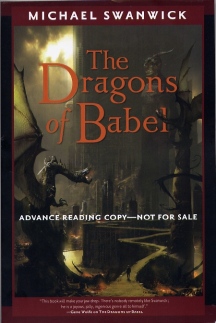
|
Another
gorgeous cover from Tor.
|
Your future has already
arrived in my mailboxes. I know it's unfair, but William Gibson did warn
us that the future has arrived – it's just
not evenly distributed. In this case, the future happens to be fantasies
that are impure in every manner possible. The fantasy worlds our authors
are offering us now are no medieval heavens. They are not our past done
up in pastels with elves, dwarves and magicians. Nor are they idealized
versions of the present with same, the better for young men to come of
age. Our fantasies have become infected by the present. We are rotten
to the core. So are our dreams.
In case you’re tempted to think that there is something new under
the sun, let me first roll out 'The Dragons of Babel' (Tor / Tom Doherty
Books ; January 2008 ; $25.95) by Michael Swanwick, which is no less
than a sequel to 'The Iron Dragon's Daughter'. This novel came out first
in
the UK
in
October
of 1993, followed by a US edition in 1994, and was an excellent example
of cyber-steampunk fantasy. 'The Dragons of Babel' takes place in this
same gritty non-nonsense universe and begins when a war dragon crashes
in the lands of Faerie, declares itself king and makes young Will his
lieutenant, using Will's mind to gauge what the rest of the populace
is thinking about
their new ruler. Will of course leaves and wanders a bleak post-industrial
landscape strewn with the refuse of broken technology and covered with
a skein of magical garbage as well. If you think technological pollution
is corrosive and unpleasant, you haven’t seen magical pollution – until
you've read Swanwick's hard-edged fantasy. I love this sort of horrific
sf / fantasy / literature, all of which takes a cue from thee immortal
and justly acclaimed Gormenghast trilogy by the late Mervyn Peake.
And because we can't get enough of this sort of literature, science fiction
writer John Meaney has broken out the battle axe and launched his own bloody
assault on our senses. 'Bone Song' (Victor Gollancz ; March 15, 2007 ; £18.99)
came out earlier this year in a UK edition that may soon become very scarce.
Even the normally reserved booksellers at Handee
Books suggested in last
week's bookseller podcast interview that this would be a desirable title
to snag. As a guy who has like two copies of every UK edition of Meaney's
groundbreaking SF, I agree. That said, the American edition of 'Bone Song'
(Bantam Books ; February 26, 2008 ; $24.00) will be along shortly and here
is one case where you'll definitely want both editions. The changes from
the UK to the US version are substantial and significant. For dedicated
readers this is an ideal situation, as it gives you two chances to experience
the same work. In the rare situations where this occurs, the reading experience
of the first refracts through the second; it's like reading the director's
cut of the novel, so to speak.
'Bone Song' is set in a futuristic and fantastic world that like Swanwick's
(and China Miéville's Bas-Lag novels, for that matter, and others
as well), takes aspects of high fantasy – gargoyles, zombies, and
other supernatural critters – and uses them to populate a dark and
gritty metropolis, in this case Tristropolis, where the cops use a phone
and have to deal with "para-live" partners. The effect is simply
wonderful; well, wonderful if you're a monster hound and like your settings
bizarre and complicated just beyond the edge of your ability to comprehend
them.
But Meaney and Swanwick aren't alone in this quest; Richard Morgan, who
has made a lot of readers very happy with gritty science fiction like 'Altered
Carbon' and 'Black
Man' / 'Thirteen' told me in his
last interview about
his forthcoming fantasy, which now has a title, 'The Steel Remains' (Victor
Gollancz ; August 2008 ; [no price yet]). Morgan's take on the typical
fantasy schtick was to take on the aftermath of a LOTR-style conflict.
Good versus evil has been fought and the war has ended leaving Ringil,
Archeth and Egar jack-doodly beyond very bad attitudes and a pre-disposition
towards violence. It's PTSD in a world of drugs, alcohol and The Scaled
Folk. Of course, it's damn easy to dislike Scaled Folk, you know, the scales
really are a barrier to sympathy and understanding. And our lack thereof
makes us look tasty and delicious. And with Morgan at the helm of a fantasy
novel, expect lots of bloody violence, liberal and entertaining use of
the work "fuck" and most importantly, a gripping story about
characters you may only sort-of like as human beings but love to damn death
as fictional constructs to take you through a story.
For me, the appeal of these books is that they combine two very different
sorts of familiar landscapes to create a world that seems bigger than the
book itself, that has a life outside the pages. One familiar landscape
element comes from our very own dystopian present; the crowds, the city,
the dirt, the crappy discarded technology and the sort-of-works new stuff.
Imagine what out present would look like to a medieval knight. And that's
the second familiar ingredient; the traditional fantasy landscape, chock
a block with elves, dwarves and all sort of magical types dragged through
the greasy scrap heaps that history tells us was medieval any-damn-where.
We're familiar with the first from real life and the second from our fantasy
reading. Combine them, layer in a plot Dashiell Hammet or Raymond Chandler
and you have a world you can poke about in even when you’re not reading
the book. A reading experience that gets beyond the pages.
So here's your ticket for 2008; first, go dig out 'The Iron Dragon's Daughter'
for me from amidst all the clutter in my studio. I seem to remember seeing
it next to my copy of 'Vacuum Flowers', but I could be wrong. Then having
caught up on your homework, order up one of those scarce copies of 'Bone
Song' from the UK and read it. So now we're into January, and you're ready
for 'The Dragons of Babel'. In February, dip back into 'Bone Song' in the
US version. Then you've got a few months to hope for the new contemporary
supernatural novel from China Miéville, and to read through Meaney's
excellent SF backlist available from the foresightful minds at Pyr. By
then it's August and time for Richard Morgan's 'The Steel Remains' – I
don’t have to tell you to buy two copies of the UK HC first, do I?
Perhaps then you can hope that eventually our world will spawn some optimistic
science fiction and fantasy. But don’t count on it.
|
Agony Column Podcast
News Report : Jamais Cascio at Singularity Summit : "Science Fiction
is a really nice way of uncovering the tacit desires for tomorrow...."
|
|
|
Open
the future with Jamais Cascio. |
Today's Agony Column
Podcast News Report returns to Singularity
Summit as I speak with Jamais Cascio,
a gentleman who resides in a district
where the future is more deeply distributed
than it seems to be in the rest of the world. We talked about his Metaverse
Roadmap; the term metaverse taken directly from Neal Stephenson's 'Snow
Crash'. You
can hear the MP3 of his interview here and marvel at how
a gadget you bought your kid some five years ago changed the face
of broadcasting.
|
| |
|
10-23-07: A Review of 'Halting State' by Charles Stross
; Agony Column Podcast News : Eliot Fintushel at SF in SF
|
Second Chances
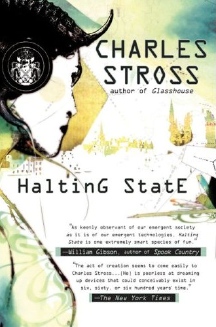 |
|
| Cover
illo by Sophie Toulouse. Cool. Different. |
For all the adventurousness
of the second-person narration featured in 'Halting
State' (Tor Books /
Tom Doherty Associates ; October 2, 2007
; $24.95), the real star of the latest novel by Charles Stross is his
ability to articulate our dissatisfaction with the present in his vision
of the (very near) future. Increasingly, we find ourselves immersed in
a relentless competition fueled by capitalism that demands we buy more
be more do more every single damn day. Amidst all the buying, being and
doing, there's not a whole lot of time for knowing, and as for history – no
need to perish the thought, it never gets into the queue.
'Halting State'
captures the cognitive dissonance of our world and repackages it in another.
You can read
my review of 'Halting State' here. If Stross follows his
usual path, you'll probably be able to read the novel online for free;
at least it will seem free. But as 'Halting State' so ably demonstrates,
everything has a cost.
|
Agony Column Podcast News ;
Eliot Fintushel at SF in SF : The Mime Speaks
|
|
| Check
out the green box on the ground. That's the Line 6 Delay modeler
and a damn good looping dealie, should you have the need for
one. |
Saturday night,
I attended and recorded my second "SF in SF" event.
This one featured Eliot Fintushel and Kage Baker. Hosted
by The Variety Children's Charity, Borderlands
Books and Tachyon Publications, this
was another stellar event, and I've got lots of great audio podcasts
that you'll
hear over the next couple of weeks. If you live in the Bay Area and have
any interest in literature and science fiction, make time for the next
event on November 17, which will feature Molly Gloss and Karen
Joy Fowler.
|
|
Who
is your apocalypse partner?
|
That said, we'll
start off the coverage of last Saturday's gig with my interview with
Eliot Fintushel conducted before the show began, and before
his theremin performance. Fintushel had an amazing rig, with a huge
Bose speaker setup and a gorgeous Bob
Moog Etherwave Pro Theremin.
This to-die-for
wood model was just a beautiful to look at as it was to listen to.
Here's an MP3 of my conversation with Eliot Fintushel, which includes
two pieces
of music.
Fintushel talked about the influence of music on his work,
in particular, his first book 'Breakfast With the Ones You Love'
(Bantam
Spectra / Random House ; February 27, 2007 ; $12.00). He also gives
a pretty damn conceptually amazing audio demonstration of his skills
as a mime,
and talks about the influence of that work on his writing.
Because I know you or someone who is trying to love you cares about
this, I've got to mention that 'Breakfast
With the Ones You Love' is pretty thin, so it won’t increase
the tilt of your to-be-read stack too threateningly. There's a good
reason that
the game Jenga appeals to readers. It's great practice for book-stacking.
|
| |
| |
|
10-22-07: A 2007 Interview With Steve Almond
|
"The path to the truth runs through shame"
|
|
Not
just another punching bag.
|
The bitter realities of our tiny lives are enough to make one buy yet
another tale of impending apocalypse. I mean, we can live in hope and
anticipation, right?
Consider the alternative, a life spent in the cringe zone, dogpaddling
through the difficulties of quotidian existence. I'd be happy to live
a life of quiet desperation; as it stands, my desperation seems to be
stuck at 11. But I'm not alone, and that's why I read writers like Steve
Almond, people who take daily trudge and turn it into something we can
laugh both at and with.
It wasn't easy getting to talk with Almond, who had a torrentially busy
schedule. We looked at going to KQED, no dice, we looked at going to
KUSP, no dice, and eventually we ended up doing the interview at his
parents' house, a beautiful, huge old home in the perfectly preserved
suburb of Palo Alto. Polished wood floors, comfortable and classy furniture,
the sun shining through a bay window. It proved to be much more idyllic
than any studio could be. And once I figured out that the recorder wall
wart did not need a three-prong plug, we were off. Almond is a fascinating
and extremely well-spoken guy, funny one moment, serious the next. I
had a blast talking to him.
I might add that listeners will immediately understand why I found it
so interesting to be in the actual Almond house. He even gave me a couple
of pieces of some kind of to-die-for candy, which I can assure you did
not last the trip home.
Here is a link to the RealAudio version; here is a link to the MP3. We
talked about his most recent book, a collection of essays, '(Not
That You Asked)', which was nice because it allowed us to cover a
variety of subjects, from the serious look at Kurt Vonnegut to the more
lighthearted
adventures in the Cringe Zone®. And yes, I am registering that as
the title of my Fox News Interview Show. I just want to know who is going
to buy the advertising?
|
| |
|
|


